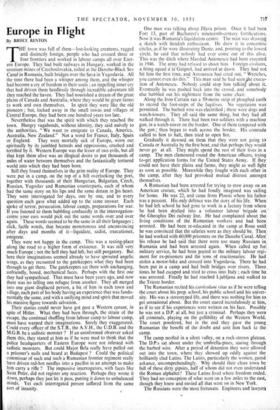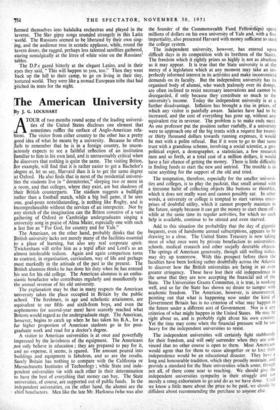Europe in Flight
By BRUCE RENTON THE town was full of them—lost-looking creatures, ragged and distinctly foreign, people who had crossed three or four frontiers and worked in labour camps all over East- ern Europe. They had built railways in Hungary, worked in the uranium mines of Czechoslovakia, toiled at the Danube-Black Sea Canal in Rumania, built bridges over the Sava in Yugoslavia. All the time there had been a whisper among them, and the whisper had become a cry of freedom in their souls ; an impelling inner cry that had driven them heedlessly through incredible adventure till they reached the haven. They had nourished a dream of the great plains of Canada and Australia, where they would be given farms to work and own themselves. In spirit they were like the old pioneers ; but, locked away in the small towns and villages of Central Europe, they had been one hundred years too late. Nevertheless that was the spirit with which they reached the town. Hungry vagabonds, without identity, they said naively to the authorities, " We want to emigrate to Canada, America, Australia, New Zealand." Not a word for France, Italy, Spain or England. They were mortally sick of Europe, worn out spiritually by its jumbled hatreds and oppressions, crushed and terrified by it. Western Europe was the lesser of two evils, but all that kept them alive was an illogical desire to put thousands of miles of water between themselves and the fantastically tortured world into which they had been born.
Still they found themselves in the grim reality of Europe. They were put in a camp, on the top of a hill overlooking the port, together with thousands of their Hungarian, Bulgarian, Czech, Russian, Yugoslav and Rumanian counterparts, each of whoni had the same story on his lips and the same dream in ,Dis heart. They were interrogated for days, one by one, and to every question each gave what added up to the same answer. Each spoke of terror, persecution, labour camps, preparations for war. If you listened to them babbling confusedly in the interrogation- centre your ears would pick out the same words over and over again. These words seemed to be the same in all their languages ; slick, facile words, that became monotonous and unconvincing after days and months of it—liquidate, sadist, executioner, emigrate. They were not happy in the camp. This was a resting-place along the road to a higher form of existence. It was still very much Europe ; not the hell they had left, but still purgatory. But here their imaginations seemed already to have sprouted angelic wings, as they recounted to the gatekeepers what they had been through to get there. The gatekeepers sat there with unchanging, unfriendly, bored, mechanical faces. Perhaps with the first one they had sympathised. That must have been years ago, and now there was no telling one refugee from another. They all merged into one giant displaced person, a bit of him in each town and village, each part of his body having an experience that was funda- mentally the same, and with a unifying mind and spirit that moved his massive figure towards salvation. Their stories could never have got past a Western censor, in spite of Hitler. What they had been through, the strain of the escape, the continual shuffling from labour camp to labour camp, must have warped their imaginations. Surely they exaggerated. Could every officer of the S.T.B., the A.V.H., the U.D.B. and the M.G.B. be a sadistic monster ? If an uninformed observer asked them this, they stared at him as if he were mad to think that the police headquarters of Eastern Europe were not infested with sadistic monsters. But could Major Bela really have pulled out a prisoner's nails and beard at Budapest ? Could the political commissar of such and such a Rumanian frontier regiment really have driven red-hot needles into a pacifist in an attempt to make him carry a rifle ? The impassive interrogators, with faces like Saint Peter, did not register any reaction. Perhaps they wrote it down, perhaps they just let it pass, putting it down to unbalanced minds. Yet each interrogated person suffered from the same sort of insanity. • One man was talking about Jilava prison. Once it had been Fort 13, part of Bucharest's nineteenth-century fortifications. Now it was Rumania's liquidation centre. The man was drawing a sketch with fiendish enthusiasm. He drew it in concentric circles, as if he were illustrating Dante, and, pointing to the lowest circle, he said that nobody had ever come out of this alive. This was the ditch where Marshal Antonescu had been executed in 1946. The army had refused to shoot him. Foreign civilians, a firing squad a la Guignol, had arrived at dawn. They had not hit him the first time, and Antonescu had cried out, " Wretches, you cannot even do this." This man said he had seen jhe execu- tion of Antonescu. Nobody could stop him talking about it. Eventually he was pushed back into the crowd, and somebody else babbled out his nightmare from the same chair.
Along the Iron Curtain ran a 50-metre strip of ploughed earth' to record the foot-steps of the fugitives. No vegetation was permitted. The barbed wire was electrified ; there were dogs and watch-towers. They all said the same thing, but they had all walked through it. There had been two soldiers with a machine gun, in a watch-tower on the border. One of them tampered with the gun ; then began to walk across the border. His comrade called to him to halt, then tried to open fire.
Gradually it dawned on them that they were not going to Canada or Australia by the Arst boat, and that perhaps they would never go at all. They might spend the rest of their lives in a camp. The men' clamoured round the American officers, trying to•get application forms for the United States Army. If they could- not have their plains and farms, they might as well fight as soon as possible. Meanwhile they fought with each other in the camp, after they had provoked mutual distrust amongst themselves.
A Rumanian had been arrested for trying to stow away on an American cruiser, which he had fondly imagined was sailing for home. He was 22, and came from Ploesti where his father was a peasant. His only defence was the story of his life. When he had left school he had gone to work in a factory from where he had been drafted into a volunteer labour brigade on the Gheoghiu Dei railway line. He had complained about the living conditions of the Rumanian workers and had been arrested. He had been re-educated in the camp at Rosu he was convinced that the salaries were as they should be. Then;, he had worked with 60,000 prisoners on the Danube Canal. After, his release he had said that there were too many Russians ink. Rumania and had been arrested again. When called up for' , military service, he had been posted to the military labour regi-, ment for ex-prisoners and the sons of reactionaries. He had stolen a motor-bike and crossed into Yugoslavia. There he had been put in a camp and had built bridges over rivers. Three * times he had escaped and tried to cross into Italy ; each time he, was arrested. Finally he had reached Ljubljana and walked to the Trieste border.
The Rumanian recited his curriculum vitae as if he were telling -the court about his prep. school, his public school and his univer- sity. His was a stereotyped life, and there was nothing for him to , get sensational about. But the court stared incredulously at him,: as if to see if his experiences were written on his face. Possibly he was not a D.P. at all, but just a criminal. Perhaps they were all criminals, playing on the gullibility of the Western World. The court pondered, but in the end they gave the young ; Rumanian the benefit of the doubt and sent him back to the , camp.
The camp nestled in a silent valley, on a rock-strewn plateau. The D.P.s sat about under the umbrella-pines, staring through the barbed wire. After a period of detention they were allowed out into the town, where they showed up oddly against the brilliantly clad Latins. The Latins, particularly the women, gazed askance, uncomprehendingly. Why should their clean town be full of these dirty gipsies, half of whom did not even understand the Roman alphabet? These Latins lived where freedom ended. They had no conception of what went on a few miles to the east, though they knew and envied all that went on in New York. The Russians were the most fortunate. Engineers and lawyent formed themselves into balalaika orchestras and played in the taverns. The Slav gipsy songs sounded strangely in this Latin world. The Russians seemed to be liberated by their own sing- ing, and the audience rose in ecstatic applause, while, round the tavern doors, the ragged, perhaps less talented satellites gathered, staring nostalgically at the litres of white wine on the Russians' tables.
The D.P.s gazed bitterly at the elegant Latins, and in their eyes they said, " This will happen to you, too." Then they went back up the hill to their camp, to go on living in their tiny, ,tortured world. They were like a nomad European-tribe that had 'pitched its tents for the night.



































 Previous page
Previous page